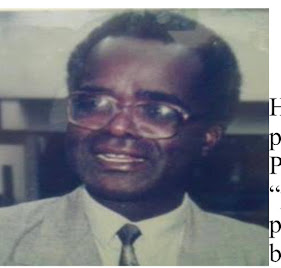Odera Oruka
Henry Odera Oruka (1944-1995) popularized the term “Sage Philosophy Project,” and closely related terms such as “philosophic sagacity,” both by initiating a project of interviewing African sages, and by naming this project in a widely read popular article as the most promising of four trends of the relatively new field of African philosophy.
Although the definition of the key terms is not always completely uniform, at the heart of this approach to African philosophy lies the emphasis on academically-trained philosophy students and professors interviewing non-academic wise persons whom Oruka called “sages,” and then engaging philosophically with the interview material. Oruka usually (but not always) emphasized keeping the identity of the individual sage well known. He also insisted that it was the sage who knew the traditions of his or her ethnic group the best, and who would be able to have critical distance to evaluate and sometimes reject prevailing beliefs and practices.
The goals of collecting the interviews and evaluating them have been articulated in Oruka’s many works. The first goal was to help construct texts of indigenous African philosophies. Before Oruka’s project there was a dearth of existing texts and a need to record indigenous ideas, both for posterity (that is, for a sense of identity and for historical reasons) and for the present and future. African wisdom that had been marginalized by academia, and by city life, could provide valuable solutions to contemporaneous problems in Africa. Such texts of interviews could also sustain intellectual curiosity and provide practical guidance (or phronesis).
Oruka searched for sages and wanted a wider public to know not only their words (written down in transcripts) but also about their lives. For him, a sage’s worth was not only in their ideas but also in the way they live: by embodying their philosophies, developing their character, and affecting their communities over the years. After all, the sages in Kenya operate in contexts of social conflict and exploitation. Sages are those from whom others seek moral and metaphysical advice and consultation on issues involving moral and psychological attitudes and judgments.Oruka looked to the term japaro in Luo, meaning “thinker,” to approximate the translation of sage. The term japaro is closely related to jang’ ad rieko which means “professional advisor.” He emphasized that people would single out sages for advice on even the most delicate matters
Source: Internet Encyclopedia of Philosophy









0 Comments